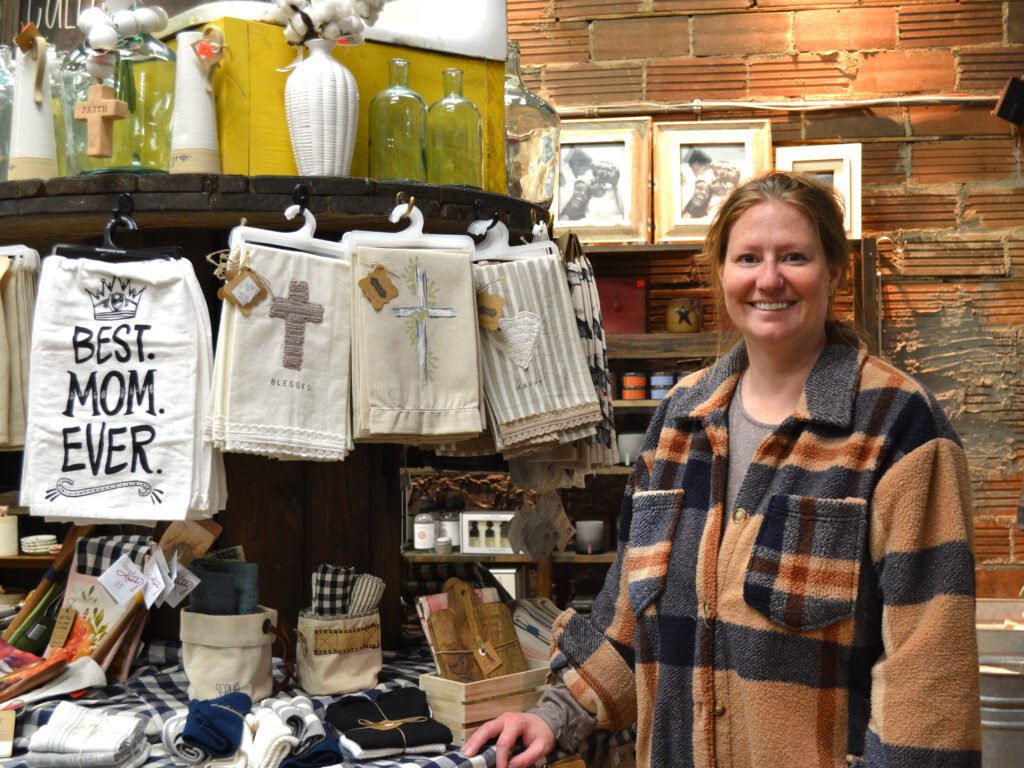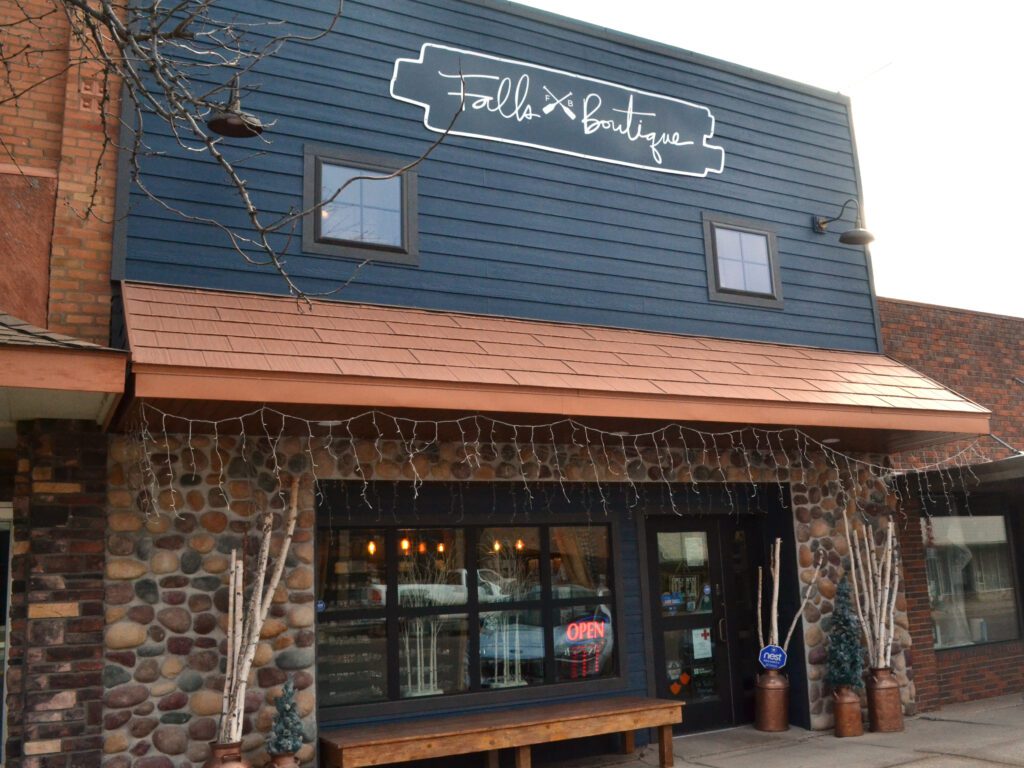
Never in her wildest dreams did Melissa Syring see herself owning Falls Boutique in downtown Granite Falls. In fact, she tried to sell her storefront in 2015. It was her photography studio at the time and wasn’t getting a lot of foot traffic. There weren’t any interested buyers for the building, so Melissa kept looking for ways to bring people in.
She got the idea for a home-based vendor show for Christmas. That original event with just a handful of sellers grew into Falls Boutique, opened in 2017. Nearing a decade in business, it’s part of a vibrant downtown that continues to reshape itself alongside the community.
“A small business helps the community because it keeps people coming to town, spending money getting lunch and gas,” Melissa said. “If one of us wins, we all win. In order to have a strong community, you have to have people who are going to work together.”
Creating a collaborative boutique
As a photographer, one of Melissa’s strengths was her creativity. It has served her well in retail, too, starting with the business model for Falls Boutique. The shop is stocked by nine vendors. Each purchases their own merchandise, making it possible to give lots of options while spreading out the cost of inventory.

Vendors originally had to staff some hours, but that didn’t work well. Now Melissa maintains staffing and relies on a Square point-of-sale system to easily tie purchases to the right vendor. She also does all the merchandising to give her store a cohesive look and feel.
“We try to find really unique products that you can’t find online,” Melissa said. “I just wanted a place where people could go and wouldn’t have to go to The Cities, like the elderly ladies who can’t drive that far. I just like being able to be here for them to help them out too.”
Being part of the community matters to Melissa and her husband, David, who have raised two sons in Granite Falls: One is a senior at Yellow Medicine East, the other recently married. David runs a beef operation outside of town, making it a two-entrepreneur household.
Stocking the shelves with what shoppers want

When Falls Boutique opened, the focus was more on clothing. But shoppers gravitated toward gifts and home essentials like detergent and hand soap. Some items are still for fun: The store sells just as many Christmas ornaments throughout the year as it does in December.
The shop fills an entire long, skinny brick building that seems to go on forever with baby clothes, greeting cards, roasted coffee, beauty products and more. When asked to pick a favorite, Melissa said it has to be goat milk lotion.
“Before I had that lotion, my hands would be raw. That’s one brand that we have had since the beginning,” she said.
Along with the variety of inventory, Melissa makes sure there are price points to meet every budget. She also has a rewards program for repeat shoppers and is always thinking of new ideas to help the store grow and flourish – keeping a notebook handy on her nightstand to jot down inspiration.
Falls Boutique relies on resources and partnerships
Despite her best efforts, life as a retailer has been extremely challenging since 2020. Prices went up for inventory and shipping, and the competition from online giants has gotten stiffer, Melissa said. Even when the boutique helps launch a new brand or product, they often get left behind when that startup makes it big and no longer fulfills small orders.
“We do our best. We love the product, we sell the product and sometimes we still lose the product,” Melissa said. “This business is not an easy business.”
That’s why it’s important to have partners. Southwest Initiative Foundation (SWIF) has been there for Melissa as a resource. Melissa borrowed capital through SWIF’s business loan programs not once, but twice. She receives free technical assistance for business planning and financials analysis, accounting software training, marketing assistance and other training opportunities for the life of the loan.
“Without SWIF, I wouldn’t be here today,” Melissa said. “It’s not just the money. Honestly the financial aspect is huge, but I think the other benefits are just as valuable as the loan itself. I can’t even put into words the value of that, because you don’t have a lot of guidance as a business owner. I went to college for business in 2001. Things have changed a little bit since then.”
Investing capital in rural entrepreneurs
The current loan for Falls Boutique was made possible thanks to a program related investment (PRI) by the Women’s Foundation of Minnesota through a below-market interest rate loan to SWIF. This investment is disbursed as loans for women entrepreneurs in southwest Minnesota, which in turn help create economic mobility for everyone in the region.
The Women’s Foundation uses program related investments to strengthen economic opportunities for women and girls, with an emphasis on rural and Greater Minnesota, Latinx, African, and immigrant communities.

“Driving our economic impact through mission-aligned investing is key to transforming our state so that women and families have abundant pathways to build equity and create generational wealth,” said Heidi Walsh, Executive Vice President of Finance & Operations for the Women’s Foundation of Minnesota.
The Women’s Foundation investment in SWIF also supported loans for Rejuvenate Spa in New London, owned by Toni Koch, and TJ Petals & More in Olivia, owned by Trenna Jeppesen.
“We continue to see an increase in demand for our programs and resources, especially for entrepreneurs,” said SWIF President Scott Marquardt. “The Women’s Foundation investment is helping us meet that growing demand, and we’re grateful for the opportunity.”
Foundation loan programs are at historic deployment levels, with the total number of current loans in SWIF’s portfolio accounting for 23 percent of total loan volume since 1986. In fiscal year 2024 alone, SWIF disbursed 59 new loans totaling $2.7 million to help launch and grow local businesses.




